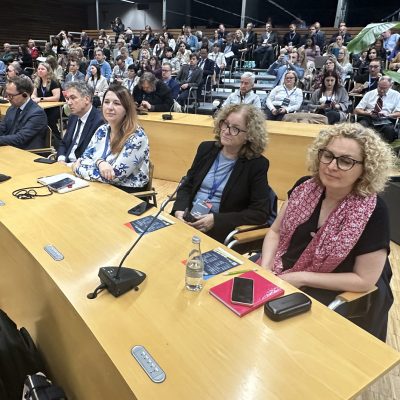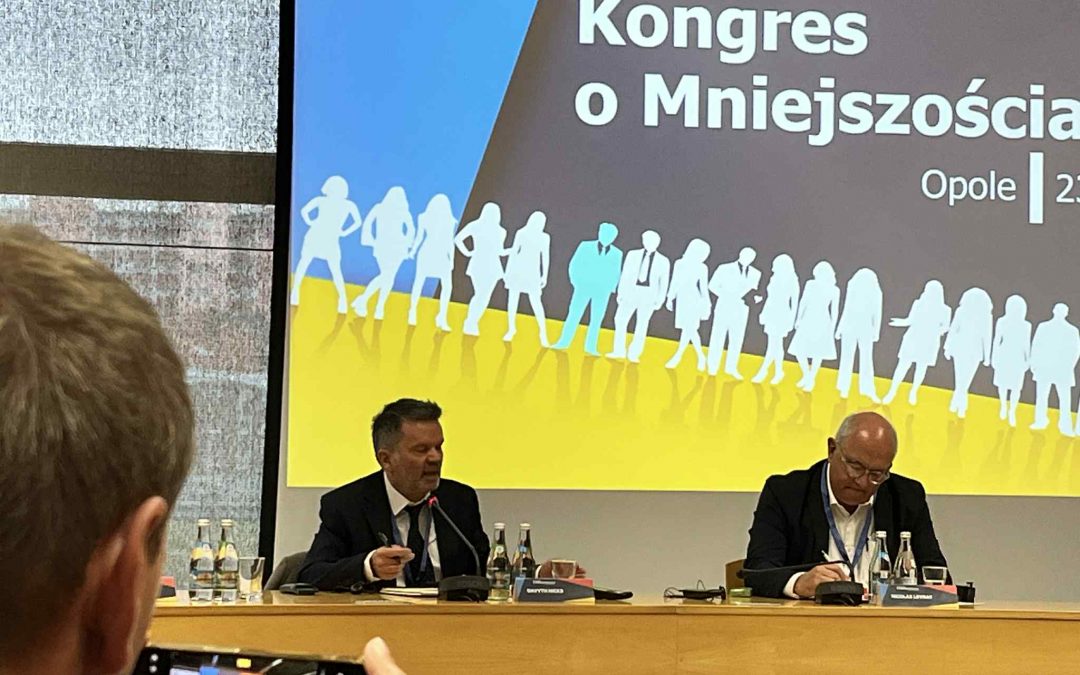On September 23 and 24, 2025, the Opole regional assembly hosted the Congress on National Minorities, an event commemorating the 20th anniversary of the Act on National and Ethnic Minorities and Regional Languages, and given an international dimension with the participation of European Language Equality Network and the UN Special Rapporteur for Minorities. The Congress created a space for an important conversation about how the challenges facing national and linguistic minority communities in Poland and Europe are changing.
The starting point for debate was the law passed in January 2005 that, for the first time, systematically guaranteed the rights of national minorities in Poland. It enabled the teaching of minoritised languages in schools, the introduction of bilingual place-names, and the use of minoritised languages in administration. Two decades later, it was time to sum up its effects.
Opening the Congress the Polish Deputy Secretary of State at the Ministry of Science and Higher Education, Andrzej Szeptycki, said that “The Republic of Poland has historically been a tolerant country. Multinational and multireligious. This is a heritage we gladly support…But the past is one thing. Europe’s present day, which is also multinational and multicultural, is another. And international, EU, and national regulations strive to protect this multiculturalism,” he noted.
Speaking on the opening panel ELEN Secretary-General Davyth Hicks discussed the progress that has been made over the last 20 years across Europe in ensuring minoritised language rights and language recovery, for example, where minoritised language immersion education has become normal for millions of children, but that many States, such as France, still continue with polices designed to eradicate their minoritized languages.
While Dr. Hicks welcomed the Polish Government’s active engagement with its national and linguistic minority communities, he underlined the continuing need by all European states to ensure the full implementation of minoritised language measures coupled with substantive funding in order to ensure adequate language protection and development. He stressed that all European endangered and minoritized languages communities need to see the EU establish clear, unambiguous minoritized language rights. He added that ELEN is currently working with the UN Special Rapporteur on its new advocacy strategy with the EU to be discussed at the upcoming ELEN General Assembly in November. Concluding, Dr. Hicks welcomed the Minister’s support for language diversity and called on the Polish Government to support the current campaign for EU official status for Catalan, Basque and Galician at the EU Council.
The UN Special Rapporteur for Minorities, Prof. Nicolas Levrat, raised broader issues over the lack of action by the EU to protect national minorities. He pointed out that in 1994, “the UN Human Rights Committee explained that the rights recognized to persons belonging to minorities by Article 27 of the ICCPR [International Covenant on Civil and Political Rights] were specific and additional rights to all other human rights, that these persons shall enjoy without discrimination – as guaranteed by Article 2 of the ICCPR.”
Prof. Levrat continued, “In Europe, the EU proclaims in Article 2 of the Treaty of the European Union that, “The Union is founded on the values of respect for human dignity, freedom, democracy, equality, the rule of law and respect for human rights, including the rights of persons belonging to minorities. These values are common to the Member States in a society in which pluralism, non-discrimination, tolerance, justice, solidarity and equality between women and men prevail.” This is a complete reversal of the place and role of the rights of persons belonging to minorities in society; from additional rights in the UN Human Rights framework, they become a foundational value on which EU and its Member-States’ polities have to be built. As UN Special Rapporteur on Minority Issues, I expect the EU and its member States to live up to this constitutional commitment and to consider minority rights as foundational to European societies.”
Mr. Rafał Bartek, chairman of the provincial assembly and leader of the German minority organization VdG, pointed out that it is in the Opole region that the strength of the community and opposition to actions restricting minority rights are visible. “It was here, when the number of hours of German language instruction in schools was reduced in 2022, that as many as 40 of the 54 municipalities decided to finance additional lessons themselves. Not to fight the government, but to prevent children from being harmed. This shows that in our region, minorities are visible, and their rights are not just a byword. Bilingual signs in 29 municipalities, bilingual signs at train stations – all of these are elements of the landscape that build our identity. But we also look to the future with concern. The number of German speakers is falling, and fewer and fewer students are choosing German for their final exams. This is a signal that we need systemic support if we want to preserve the language and culture for future generations.”
The conference continued with workshops and presentations at the University of Opole including a workshop on national minority education with Aleksandra Oszmiańska-Paget and Vesna Crnić-Grotić from the Committee of Experts (COMEX) of the European Charter for Regional or Minority Languages, moderated by Davyth Hicks from ELEN.

The Wednesday morning featured a panel moderated by COMEX chief Aleksandra Oszmiańska-Paget on National and Ethnic Minorities in Europe with Helena Duć-Fajfer (Jagiellonian University) who focused current issues faced by the Lemko national minority, Bernard Gaida from Arbeitsgemeinschaft der Deutschen Minderheit with a range of insights on German national minority issues, and Davyth Hicks from ELEN providing an overview of current issues affecting minoritized languages across Europe and ELEN’s work to deal with these issues.
ELEN member organisations featured in several of the workshops with Sergiusz Bober, Craig Willis and Vello Pettai from ECMI, and Artur Jabłoński from the Kashub NGO Perspektiva Kaszëbskô Associotion, all contributing to the Congress.
The Congress was hosted by the University of Opole and organized by Dr. Marek Mazurkiewicz and his team with the support of the following institutions: the Opole Voivodeship Government, the Voivode of Opole, the European Centre for Minority Studies, the House of Polish-German Cooperation, the Centre for German Minority Studies, the Silesian Institute, the Polish Political Science Association Opole Branch, and the Centre for Border and Regional Studies at the University of Opole. The event was held under the patronage of the Minister of Interior and Administration and the Minister of Science and Higher Education. (Eurolang 2025)

